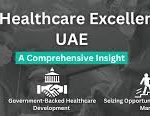A Hub of Excellence in UAE Healthcare
The healthcare system in the United Arab Emirates (UAE) has rapidly emerged as a global model of excellence, showcasing an impressive trajectory from basic facilities to cutting-edge medical services in just a few decades. With state-of-the-art hospitals, advanced medical technology, and an increasing focus on research, innovation, and education, the UAE has become a destination for quality healthcare in the Middle East and beyond.
This article explores how the UAE has positioned itself as a hub of excellence in healthcare by investing in world-class infrastructure, attracting top medical professionals, advancing in medical technology, and promoting health tourism. It will also discuss the government’s emphasis on public health initiatives, the integration of artificial intelligence (AI) and telemedicine, and the challenges the country faces as it aims to further elevate its healthcare standards.
The Foundation of a World-Class Healthcare System
The UAE’s healthcare journey started in the early 1970s, with the establishment of its national healthcare system shortly after the country’s formation. The government made healthcare a priority, building hospitals and clinics to ensure basic services for all citizens. Over time, the UAE recognized that excellence in healthcare was essential to the country’s broader vision of development.
The government’s investments have since turned the UAE into a regional leader in healthcare. Today, the UAE has numerous internationally accredited hospitals, including Cleveland Clinic Abu Dhabi, the Mediclinic Middle East group, and specialized centers within Dubai Healthcare City (DHCC). These institutions are not just healthcare providers but also centers of innovation, research, and medical education.
The expansion of private sector participation has further boosted the healthcare system’s capacity. Renowned international healthcare brands such as Mayo Clinic and King’s College Hospital have established facilities in the UAE, bringing world-class medical expertise to the region. The collaboration between the public and private sectors has enabled the UAE to meet the growing demand for healthcare services while ensuring high standards of care.
Investment in Cutting-Edge Infrastructure
One of the key drivers of the UAE’s healthcare success is its investment in healthcare infrastructure. The government’s ambitious vision is clearly visible in projects like the Cleveland Clinic Abu Dhabi and Dubai Healthcare City. These facilities are equipped with the latest medical technologies, from robotic surgery systems to specialized oncology and cardiovascular centers.
Dubai Healthcare City, for example, is a 4.1 million square foot development dedicated to providing quality healthcare services, education, and research. With over 160 clinical facilities and partnerships with international institutions, DHCC is a significant contributor to Dubai’s reputation as a leading healthcare destination.
Cleveland Clinic Abu Dhabi, on the other hand, is an iconic symbol of healthcare excellence, offering a range of specialized services such as cardiac care, neurology, and oncology. Its world-class infrastructure, coupled with highly trained medical professionals, attracts patients from across the Middle East and beyond.
These investments are part of the UAE’s broader healthcare strategy to ensure that medical services are not only accessible but also of the highest international standards.
Medical Tourism: A Magnet for International Patients
Medical tourism has become a key pillar in the UAE’s healthcare strategy. The government’s vision of making the UAE a hub for medical tourism is reflected in the country’s comprehensive approach to attracting international patients. From state-of-the-art facilities to streamlined visa processes and luxury accommodations, the UAE offers a holistic healthcare experience that appeals to patients from across the globe.
Dubai, in particular, has positioned itself as a major destination for medical tourism through initiatives like the Dubai Health Experience (DXH). DXH packages include treatment, accommodation, visa support, and tourism options, making the process smooth for international patients. Patients come to the UAE for various treatments, including cosmetic surgery, orthopedics, fertility treatments, and cardiovascular care.
According to the Dubai Health Authority (DHA), Dubai aims to attract half a million medical tourists by 2025. The UAE’s geographic location is another advantage—it serves as a gateway between Europe, Asia, and Africa, providing convenient access to world-class medical care without the need for long-distance travel.
The quality of medical facilities is a significant draw for international patients. Several hospitals in the UAE have received accreditation from global organizations such as the Joint Commission International (JCI). This focus on meeting and exceeding global healthcare standards has made the UAE a leader in medical tourism.
Advancements in Medical Technology
The UAE has embraced technological advancements in healthcare, which has significantly contributed to the country’s reputation as a hub of excellence. From artificial intelligence (AI) to telemedicine, the integration of technology into healthcare delivery has enhanced the quality, efficiency, and accessibility of care.
AI is being utilized in various fields, from improving diagnostic accuracy to predicting patient outcomes. For example, AI-powered systems are being used in radiology and pathology to detect diseases like cancer in their early stages, improving treatment success rates. AI is also used to analyze large sets of medical data, helping doctors create personalized treatment plans for patients with complex conditions.
Telemedicine has also gained momentum, especially in the aftermath of the COVID-19 pandemic. Teleconsultations, remote monitoring, and virtual health platforms have made healthcare more accessible to residents and international patients. The UAE’s healthcare sector has embraced digital health solutions, ensuring patients can consult with specialists from around the world without the need to travel.
Moreover, robotic surgery is another area where the UAE is excelling. Hospitals such as Mediclinic City Hospital and Cleveland Clinic Abu Dhabi are equipped with robotic surgical systems like the da Vinci robot, which allows for minimally invasive procedures with higher precision and faster recovery times. These advancements have placed the UAE at the forefront of modern medical practices, offering patients access to the latest treatment modalities.
Public Health Initiatives and Preventive Care
In addition to providing top-notch medical services, the UAE has focused heavily on public health and preventive care. Recognizing that prevention is better than cure, the UAE government has launched several initiatives to address major public health challenges, such as obesity, diabetes, and cardiovascular disease.
One of the major public health campaigns in the UAE is the “Weqaya” program, which was launched by the Department of Health – Abu Dhabi. The initiative offers comprehensive screening for chronic diseases, helping residents identify and manage conditions like diabetes and hypertension before they become life-threatening. The program also promotes lifestyle changes and preventive measures to combat the rise in non-communicable diseases.
The UAE’s obesity and diabetes rates have been a significant public health concern, driven by sedentary lifestyles and poor dietary habits. To address this, the government has launched nationwide campaigns to encourage physical activity and healthy eating. The Dubai Fitness Challenge, for instance, encourages residents to commit to 30 minutes of physical activity daily for 30 days. This initiative is part of a broader effort to foster a culture of health and wellness in the UAE.
Vaccination programs are another cornerstone of the UAE’s public health strategy. During the COVID-19 pandemic, the UAE was one of the first countries to roll out a nationwide vaccination campaign, achieving one of the highest vaccination rates globally. The country’s rapid and efficient response to the pandemic has been widely praised and has set a benchmark for public health preparedness.
Focus on Research, Innovation, and Education
The UAE is not only a leader in providing healthcare services but also in fostering medical research and innovation. Recognizing the importance of research in advancing healthcare outcomes, the UAE has established partnerships with leading academic and research institutions worldwide.
The Mohammed Bin Rashid University of Medicine and Health Sciences (MBRU) and the Khalifa University of Science and Technology are key players in medical research and education in the UAE. These institutions offer cutting-edge research facilities and programs that aim to develop the next generation of healthcare professionals while advancing the field of medicine.
MBRU, in particular, focuses on translational research, which seeks to bridge the gap between laboratory findings and clinical practice. By fostering a culture of research and innovation, the UAE is not only addressing local healthcare challenges but also contributing to the global body of medical knowledge.
Moreover, the UAE is investing in the development of a homegrown healthcare workforce. While the country has historically relied on expatriate medical professionals, efforts are being made to encourage Emirati nationals to pursue careers in healthcare. Continuous professional development programs and partnerships with international organizations ensure that healthcare professionals in the UAE are well-equipped with the latest knowledge and skills.
Challenges Facing the UAE Healthcare System
Despite its achievements, the UAE’s healthcare system faces several challenges. One of the primary challenges is the growing demand for healthcare services due to population growth and the increasing prevalence of chronic diseases. Managing this demand while maintaining the quality and affordability of services will require continued investment and innovation.
Healthcare costs, particularly for specialized treatments, remain a concern for both the government and private sector. As the country continues to attract medical tourists and provide high-quality care to its residents, managing the balance between cost and excellence will be a critical factor in maintaining the UAE’s leadership in healthcare.
Another challenge is ensuring the long-term sustainability of the healthcare workforce. While the UAE has successfully attracted top talent from around the world, developing a skilled Emirati workforce remains a priority. Programs to encourage local talent to enter the healthcare field will be essential for the country’s future healthcare capacity.
Conclusion
The UAE has transformed itself into a hub of healthcare excellence, combining world-class infrastructure, cutting-edge technology, and a commitment to public health and medical research. Its investments in hospitals, medical tourism, and technological advancements have positioned the UAE as a global leader in healthcare services. The country’s focus on preventive care, coupled with its innovative approach to healthcare delivery, ensures that patients in the UAE receive high-quality, patient-centered care.
As the UAE continues to address challenges such as healthcare demand, costs, and workforce development, its commitment to excellence and innovation will ensure that it remains at the forefront of global healthcare advancements. With a clear vision for the future, the UAE is poised to lead the region and the world in delivering exceptional healthcare services for years to come.


